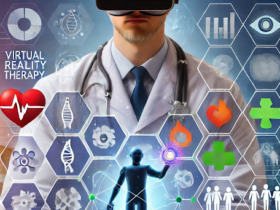The interwoven nature of mental health and nutrition has long been recognised in the medical community, yet only recently has it entered the popular consciousness as a pivotal aspect of overall wellness. As society becomes more invested in the holistic nature of health, individuals are turning to innovative solutions that provide comprehensive care. Among these, the role of a telehealth dietitian emerges as a key player in enhancing mental well-being through virtual nutritional counselling.
Nutrition and Mental Health: An Indisputable Connection
Nutrition’s significant impact on mental health is no mere hypothesis; it is a fact supported by a multitude of studies. The brain, an organ with a high metabolic demand, requires a variety of nutrients to function optimally. These range from macro-nutrients like carbohydrates, proteins, and fats, to micro-nutrients like vitamins and minerals. The complex relationship between diet and brain chemistry affects mood, thought processes, and even the risk of developing mental health disorders.
It is not simply about consuming enough calories; it’s about ensuring that those calories are sourced from nutrient-rich foods that support cognitive function and emotional regulation. Deficiencies in certain nutrients, such as omega-3 fatty acids, B vitamins, and iron, can lead to measurable changes in mood and cognitive abilities, emphasising the importance of a balanced diet for mental well-being.
The Rise of Telehealth Dietetics
The advent of technology in health care has given rise to telehealth services, revolutionising the way nutritional advice is delivered. Telehealth dietetics allows accredited nutrition professionals to conduct consultations remotely, providing convenience and accessibility to individuals seeking dietary support. This modality of service delivery has become especially important during the Covid-19 pandemic, which highlighted the need for accessible health services while maintaining social distance.
A telehealth dietitian is equipped to provide personalised nutritional counselling through virtual platforms, ensuring that individuals have access to expert dietary advice, regardless of their location or ability to travel. This service is particularly beneficial for those with busy schedules, mobility issues, or those living in remote areas with limited access to healthcare professionals.
The Role of a Telehealth Dietitian in Mental Health
The role of a dietitian extends beyond the realm of physical health; these professionals are also instrumental in promoting mental wellness. A telehealth dietitian specialises in understanding the link between diet and mental health, offering guidance that supports both the mind and body.
Through individualised nutrition plans and supportive coaching, a telehealth dietitian can help clients address specific concerns such as stress, anxiety, and depression. They work closely with clients to develop dietary strategies that enhance mood, improve energy levels, and manage symptoms of mental health disorders.
Personalisation of Dietary Plans
A core component of a telehealth dietitian’s approach is the personalisation of dietary advice. Recognising the fact that every individual’s needs are different, dietitians tailor their recommendations to align with the client’s unique lifestyle, preferences, and mental health status. Comprehensive assessments and ongoing monitoring allow for adjustments to be made, ensuring that each person receives the most suitable and effective nutritional guidance.
Accessibility and Immediate Support
In moments of acute mental distress, immediate support can be crucial. A telehealth dietitian provides an accessible point of contact for clients when they need advice or motivation to stick to their dietary plans. This immediacy can be particularly useful for maintaining mental health, as nutritional choices often have a rapid impact on how an individual feels.
Educational Component
Education is a key aspect of therapy provided by telehealth dietitians. Through education, individuals become empowered to make informed decisions about their diet. Understanding the ‘why’ behind dietary recommendations fosters a greater commitment to sticking with these changes, leading to better mental health outcomes.
Supportive Environment
In addition to dietary guidance, telehealth dietitians often offer a supportive and non-judgemental space for clients to discuss their struggles and victories. This emotional support can contribute significantly to an individual’s mental well-being and motivation to continue their wellness journey.
Overcoming Misconceptions
There may be misconceptions regarding the effectiveness of virtual nutritional counselling compared to in-person visits. However, research suggests that telehealth nutrition services can be just as effective, if not more so, due to the added benefits of convenience and regular support.
Additionally, some might assume that telehealth services are impersonal, but on the contrary, many clients report building strong therapeutic relationships with their dietitians through regular virtual consultations.
Conclusion
The integration of nutritional counselling and mental health support through the expertise of a telehealth dietitian represents a modern approach to health and well-being. By addressing the body’s nutritional needs, individuals can significantly enhance their mental health and overall quality of life. The convenience, personalisation, and supportive nature of telehealth dietitian services make them an invaluable resource in the quest for holistic wellness. As we embrace the digital age in healthcare, it becomes increasingly clear that dietetics will play a crucial role in the future of mental health support.
In conclusion, prioritising mental health is an integral part of full-body wellness and should be treated as such. Through the expert guidance of a telehealth dietitian, anyone can take meaningful steps towards a healthier mind and body, demonstrating that true health is about nourishment, not deprivation.
For More VIsit Walkermagazine














Leave a Reply